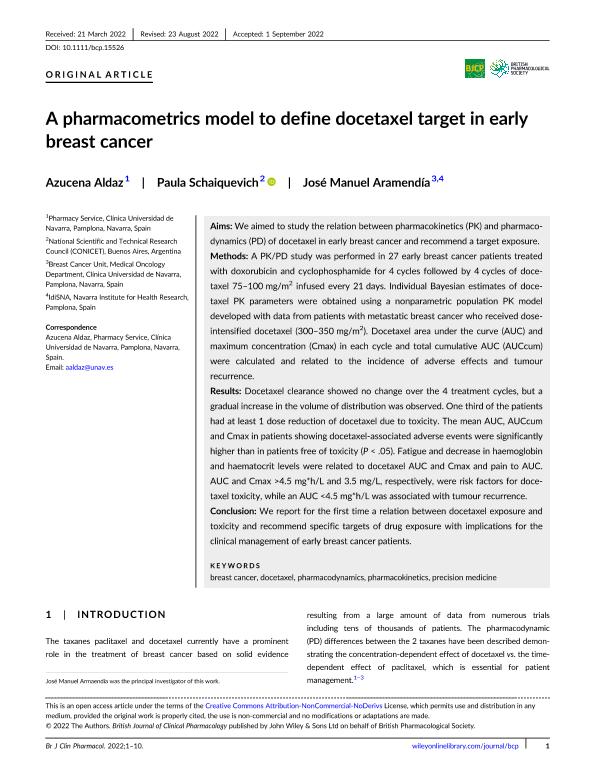Mostrar el registro sencillo del ítem
dc.contributor.author
Aldaz, Azucena
dc.contributor.author
Schaiquevich, Paula Susana

dc.contributor.author
Aramendía, José Manuel
dc.date.available
2023-06-14T18:02:45Z
dc.date.issued
2022-09
dc.identifier.citation
Aldaz, Azucena; Schaiquevich, Paula Susana; Aramendía, José Manuel; A pharmacometrics model to define docetaxel target in early breast cancer; Wiley Blackwell Publishing, Inc; British Journal Of Clinical Pharmacology; 89; 2; 9-2022; 727-736
dc.identifier.issn
0306-5251
dc.identifier.uri
http://hdl.handle.net/11336/200647
dc.description.abstract
Aims: We aimed to study the relation between pharmacokinetics (PK) and pharmacodynamics (PD) of docetaxel in early breast cancer and recommend a target exposure. Methods: A PK/PD study was performed in 27 early breast cancer patients treated with doxorubicin and cyclophosphamide for 4 cycles followed by 4 cycles of docetaxel 75–100 mg/m2 infused every 21 days. Individual Bayesian estimates of docetaxel PK parameters were obtained using a nonparametric population PK model developed with data from patients with metastatic breast cancer who received dose-intensified docetaxel (300–350 mg/m2). Docetaxel area under the curve (AUC) and maximum concentration (Cmax) in each cycle and total cumulative AUC (AUCcum) were calculated and related to the incidence of adverse effects and tumour recurrence. Results: Docetaxel clearance showed no change over the 4 treatment cycles, but a gradual increase in the volume of distribution was observed. One third of the patients had at least 1 dose reduction of docetaxel due to toxicity. The mean AUC, AUCcum and Cmax in patients showing docetaxel-associated adverse events were significantly higher than in patients free of toxicity (P <.05). Fatigue and decrease in haemoglobin and haematocrit levels were related to docetaxel AUC and Cmax and pain to AUC. AUC and Cmax >4.5 mg*h/L and 3.5 mg/L, respectively, were risk factors for docetaxel toxicity, while an AUC <4.5 mg*h/L was associated with tumour recurrence. Conclusion: We report for the first time a relation between docetaxel exposure and toxicity and recommend specific targets of drug exposure with implications for the clinical management of early breast cancer patients.
dc.format
application/pdf
dc.language.iso
eng
dc.publisher
Wiley Blackwell Publishing, Inc

dc.rights
info:eu-repo/semantics/openAccess
dc.rights.uri
https://creativecommons.org/licenses/by-nc-nd/2.5/ar/
dc.subject
BREAST CANCER
dc.subject
DOCETAXEL
dc.subject
PHARMACODYNAMICS
dc.subject
PHARMACOKINETICS
dc.subject
PRECISION MEDICINE
dc.subject.classification
Oncología

dc.subject.classification
Medicina Clínica

dc.subject.classification
CIENCIAS MÉDICAS Y DE LA SALUD

dc.title
A pharmacometrics model to define docetaxel target in early breast cancer
dc.type
info:eu-repo/semantics/article
dc.type
info:ar-repo/semantics/artículo
dc.type
info:eu-repo/semantics/publishedVersion
dc.date.updated
2023-06-14T10:59:44Z
dc.journal.volume
89
dc.journal.number
2
dc.journal.pagination
727-736
dc.journal.pais
Reino Unido

dc.journal.ciudad
Londres
dc.description.fil
Fil: Aldaz, Azucena. Universidad de Navarra; España
dc.description.fil
Fil: Schaiquevich, Paula Susana. Consejo Nacional de Investigaciones Científicas y Técnicas; Argentina
dc.description.fil
Fil: Aramendía, José Manuel. Universidad de Navarra; España
dc.journal.title
British Journal Of Clinical Pharmacology

dc.relation.alternativeid
info:eu-repo/semantics/altIdentifier/doi/http://dx.doi.org/10.1111/bcp.15526
Archivos asociados
